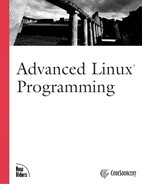Contents At a Glance
I. Advanced UNIX Programming with Linux
2. Writing Good GNU/Linux Software
11. A Sample GNU/Linux Application
E. Open Publication License Version 1.0
Table of Contents
I. Advanced UNIX Programming with Linux
1.3 Automating the Process with GNU Make
1.4 Debugging with GNU Debugger (GDB)
2. Writing Good GNU/Linux Software
2.1 Interaction With the Execution Environment
2.3 Writing and Using Libraries
4.4 Synchronization and Critical Sections
4.5 GNU/Linux Thread Implementation
7.1 Extracting Information from /proc
7.5 Drives, Mounts, and File Systems
8.2 access: Testing File Permissions
8.3 fcntl: Locks and Other File Operations
8.4 fsync and fdatasync: Flushing Disk Buffers
8.5 getrlimit and setrlimit: Resource Limits
8.6 getrusage: Process Statistics
8.7 gettimeofday: Wall-Clock Time
8.8 The mlock Family: Locking Physical Memory
8.9 mprotect: Setting Memory Permissions
8.10 nanosleep: High-Precision Sleeping
8.11 readlink: Reading Symbolic Links
8.12 sendfile: Fast Data Transfers
8.13 setitimer: Setting Interval Timers
8.14 sysinfo: Obtaining System Statistics
9.6 Maintenance and Portability Issues
10.2 Process User IDs and Process Group IDs
11. A Sample GNU/Linux Application
A.2 Finding Dynamic Memory Errors
B.4 Relation to Standard C Library I/O Functions
B.6 Reading Directory Contents
D.2 Information About GNU/Linux Software
E. Open Publication License Version 1.0
I. Requirements on Both Unmodified and Modified Versions
IV. Requirements on Modified Works
V. Good-Practice Recommendations
Open Publication Policy Appendix
Terms and Conditions for Copying, Distribution and Modification
Table of Program Listings
1.2 reciprocal.cpp (C++ source file)
1.3 reciprocal.hpp (header file)
2.1 arglist.c (argc and argv parameters)
2.2 getopt_long.c (getopt_long function)
2.3 print_env.c (printing execution environment)
2.4 client.c (network client program)
2.5 temp_file.c (mkstemp function)
2.6 readfile.c (resource allocation during error checking)
2.8 app.c (program with library functions)
2.9 tifftest.c (libtiff library)
3.1 print-pid.c (printing process IDs)
3.2 system.c (system function)
3.4 fork-exec.c (fork and exec functions)
3.5 sigusr1.c (signal handlers)
3.6 zombie.c (zombie processes)
3.7 sigchld.c (cleaning up child processes)
4.1 thread-create.c (creating threads)
4.2 thread-create2 (creating two threads)
4.3 thread-create2.c (revised main function)
4.4 primes.c (prime number computation in a thread)
4.5 detached.c (creating detached threads)
4.6 critical-section.c (critical sections)
4.7 tsd.c (thread-specific data)
4.8 cleanup.c (cleanup handlers)
4.9 cxx-exit.cpp (C++ thread cleanup)
4.10 job-queue1.c (thread race conditions)
4.12 job-queue3.c (semaphores)
4.13 spin-condvar.c (condition variables)
4.14 condvar.c (condition variables)
4.15 thread-pid (printing thread process IDs)
5.2 sem_all_deall.c (semaphore allocation and deallocation)
5.3 sem_init.c (semaphore initialization)
5.4 sem_pv.c (semaphore wait and post operations)
5.5 mmap-write.c (mapped memory)
5.6 mmap-read.c (mapped memory)
5.7 pipe.c (parent-child process communication)
5.8 dup2.c (output redirection)
5.10 socket-server.c (local sockets)
5.11 socket-client.c (local sockets)
5.12 socket-inet.c (Internet-domain sockets)
6.1 random_number.c (random number generation)
6.2 cdrom-eject.c (ioctl example)
7.1 clock-speed.c (cpu clock speed from /proc/cpuinfo)
7.2 get-pid.c (process ID from /proc/self)
7.3 print-arg-list.c (printing process argument lists)
7.4 print-environment.c (process environment)
7.5 get-exe-path.c (program executable path)
7.6 open-and-spin.c (opening files)
7.7 print-uptime.c (system uptime and idle time)
8.1 check-access.c (file access permissions)
8.3 write_journal_entry.c (data buffer flushing)
8.4 limit-cpu.c (resource limits)
8.5 print-cpu-times.c (process statistics)
8.6 print-time.c (date/time printing)
8.7 mprotect.c (memory access)
8.8 better_sleep.c (high-precision sleep)
8.9 print-symlink.c (symbolic links)
8.10 copy.c (sendfile system call)
8.11 itemer.c (interal timers)
8.12 sysinfo.c (system statistics)
8.13 print-uname (version number and hardware information)
9.1 bit-pos-loop.c (bit position with loop)
9.2 bit-pos-asm.c (bit position with bsrl)
10.1 simpleid.c (printing user and group IDs)
10.2 stat-perm.c (viewing file permissions with stat system call)
10.3 setuid-test.c (setuid programs)
10.5 temp-file.c (temporary file creation)
10.6 grep-dictionary.c (word search)
11.1 server.h (function and variable declarations)
11.2 common.c (utility functions)
11.3 module.c (loading server modules)
11.4 server.c (server implementation)
11.5 main.c (main server program)
11.6 time.c (show wall-clock time)
11.7 issue.c (GNU/Linux distribution information)
11.8 diskfree.c (free disk space information)
11.9 processes.c (summarizing running processes)
11.10 Makefile (Makefile for sample application program)
A.2 malloc-use.c (dynamic memory allocation)
A.3 calculator.c (main calculator program)
A.4 number.c (unary number implementation)
A.5 stack.c (unary number stack)
A.6 definitions.h (header file for calculator program)
B.1 create-file.c (create a new file)
B.2 timestamp.c (append a timestamp)
B.3 write-all.c (write all buffered data)
B.4 hexdump.c (print a hexadecimal file dump)
B.5 lseek-huge.c (creating large files)
B.6 read-file.c (reading files into buffers)
